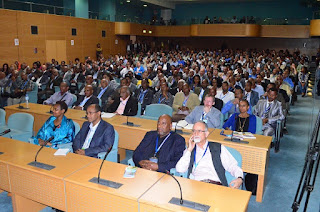After a six-week stay, I returned from Eritrea two weeks ago. The primary purpose of my trip was to: present two papers (see below) and chair one panel discussion (entitled Digital Documentation and e-Resources) at the International Conference on Eritrean Studies (ICES) which was held in Asmara, Eritrea from July 20-22, 2016. According to the organizers, thirty five different subjects were covered and there were four hundred and fifty attendees and participants.
Sadly, Dr. Samuel Mahaffy, a great friend of Eritrea, died two weeks before the Conference had convened. I had the honor of reading the paper that he had written for the plenary session entitled "Speaking of Eritrea: A Meta-Analysis of the Discourse Structure of Competing Narratives.
In the upcoming posts, I'll summarize the main arguments of my papers, interview people who had participated in the Conference, report on the various parts of my trip and so forth, but for this post,
I'll introduce you to my papers' titles and abstracts (If you're interested in having the abstracts of all the presenters at the Conference, you can download the entire file from ICES's website):
"Got Eritrea? Smart Power, the Eritrean Diaspora and Lessons from the Asia Pacific Countries"
Eritrea needs smart power in order to strengthen its hard and soft power, respectively. The Eritrean Diaspora has a major role to play in this effort. The expertise, the education, the technical know-how, the talent and etc. are in abundance. This paper argues that if Eritrea's smart power (a combination of
hard and soft power) has to have a profound impact on Eritrea and the world, the aforementioned scattered abundance along with the local production of knowledge need to be systematically
harnessed, channeled, organized and be financially supported by the government. The paper also explores that Eritrea could learn lessons from the smart power of the Asia Pacific Countries.
and
"The Role of Archives in Eritrea's National Development Project"
Most of Eritrea's development projects such as roads, dams, schools and etc. are visible, quantifiable and measurable. Could the archives (public and private) which are the center of Eritrea's collective
memory and the primary source of information, contribute to Eritrea's National Development Project and be visible, quantifiable and measurable, too? This paper examines the function, organization
and role that the archives must and should play in Eritrea's National Development Project.
Link for ICES's official website, programs and the abstracts:
http://www.ices-eritrea.org/
http://www.ices-eritrea.org/resources/
Sadly, Dr. Samuel Mahaffy, a great friend of Eritrea, died two weeks before the Conference had convened. I had the honor of reading the paper that he had written for the plenary session entitled "Speaking of Eritrea: A Meta-Analysis of the Discourse Structure of Competing Narratives.
In the upcoming posts, I'll summarize the main arguments of my papers, interview people who had participated in the Conference, report on the various parts of my trip and so forth, but for this post,
I'll introduce you to my papers' titles and abstracts (If you're interested in having the abstracts of all the presenters at the Conference, you can download the entire file from ICES's website):
"Got Eritrea? Smart Power, the Eritrean Diaspora and Lessons from the Asia Pacific Countries"
Eritrea needs smart power in order to strengthen its hard and soft power, respectively. The Eritrean Diaspora has a major role to play in this effort. The expertise, the education, the technical know-how, the talent and etc. are in abundance. This paper argues that if Eritrea's smart power (a combination of
hard and soft power) has to have a profound impact on Eritrea and the world, the aforementioned scattered abundance along with the local production of knowledge need to be systematically
harnessed, channeled, organized and be financially supported by the government. The paper also explores that Eritrea could learn lessons from the smart power of the Asia Pacific Countries.
and
"The Role of Archives in Eritrea's National Development Project"
Most of Eritrea's development projects such as roads, dams, schools and etc. are visible, quantifiable and measurable. Could the archives (public and private) which are the center of Eritrea's collective
memory and the primary source of information, contribute to Eritrea's National Development Project and be visible, quantifiable and measurable, too? This paper examines the function, organization
and role that the archives must and should play in Eritrea's National Development Project.
Link for ICES's official website, programs and the abstracts:
http://www.ices-eritrea.org/
http://www.ices-eritrea.org/resources/









No comments:
Post a Comment